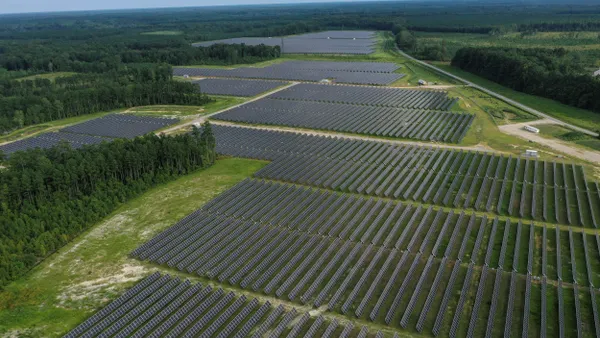Dive Brief:
- Vermont Gov. Peter Shumlin (D) on Monday vetoed a contentious renewable energy siting bill, triggering a special legislative session this week where lawmakers can amend the bill or seek to override his veto, Vermont Press Bureau reports.
- Senate Bill 230, passed on the final day of the recent legislative session, would give municipalities more say over siting new renewables projects if they design their own energy plans with state agencies. It would also put new sound restrictions on wind projects and regulations on homes with rooftop solar, which Shumlin singled out in his veto.
- Lawmakers will meet on Thursday to discuss potential changes to the bill, though legislative leaders told the Press Bureau a vote to override the governor's veto is more likely.
Dive Insight:
S.230 began as a bill to provide cities and towns more say in the siting of renewable energy projects. It would require that municipalities be given “substantial deference” during the regulatory assessment of projects if the municipalities develop energy plans approved by the Department of Public Service.
Shumlin approved of that part of the bill, saying in his veto statement that those provisions are the "core of S.230 that I would like to see become law."
But last-minute changes in the bill triggered the governor's veto. One provision would have declared wind facilities a public health emergency for the sounds they produce. Another would have limited noise from wind facilities to 10 decibels above ambient noise, a standard that Shumlin said "unintentionally relies on a standard used in a small 150 kilowatt project as the standard for all wind, large and small."
"[T]he emergency declaration and the restrictive sound standards will make it impossible to continue to sensibly site renewable wind power in Vermont," Shumlin wrote.
Claims about wind turbines’ negative health impacts are scientifically unsubstantiated, Shumlin noted. Independent reviews of available evidence by Ontario’s Chief Medical Officer of Health and Australia’s National Health and Medical Research Council found that sound from wind turbines does not cause negative health impacts.
Shumlin also rejected a bill requirement that notices of certificates of public good be filed with land records offices on sales of homes with rooftop solar arrays. This, he wrote, "could create problems for residential solar customers when they go to sell their home."
Lawmakers will meet this week to consider changes to the bill or an attempt to override Shumlin's veto. State Senate President Pro Tem John Campbell (D) told the Press Bureau a simple vote to override is more likely, and that lawmakers can amend the law if any changes are needed in the new legislative session in January.
Correction: A previous version of this article said a provision in the bill would have limited noise from wind turbines 10 decibels, but that is incorrect. The provision would limit noise 10 decibels above ambient levels.














